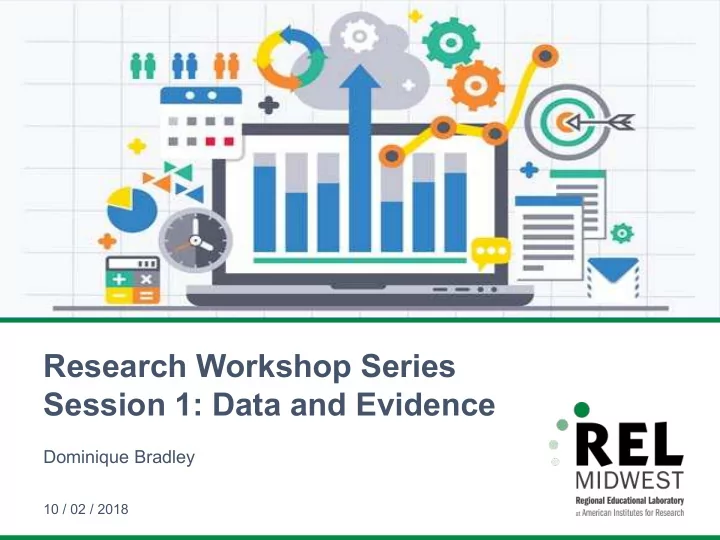

Research Workshop Series Session 1: Data and Evidence Dominique Bradley 10 / 02 / 2018
Agenda 1. What is REL Midwest? 2. Overview of training series 3. Data collection methods 4. Types of research and levels of evidence Continuous improvement model 5. 6. Session close and evaluation
Regional Educational Laboratories
REL Midwest States
Workshop Series 2018 October 2 Data, Research, and Evidence Overview November 28 Surveys and Focus Groups 2019 January 29 Interviews, Observations, and Rubric Development March 4 Understanding and Interpreting Qualitative and Quantitative Evidence April 1 Research Resources and Data Visualization
Today’s Goals 1. Discuss appropriate uses of different kinds of data collection methods. 2. Overview of different types of research and levels of evidence. 3. Discuss how ISBE uses data and evidence in the context of a continuous improvement cycle.
Data Collection Methods
Data Collection Options
Surveys are appropriate data collection tools for many purposes . . .
A survey can produce quantitative descriptions of the characteristics and viewpoints of a population.
Focus Groups Participant interaction can provide a rich description of views and experiences.
Focus Groups Explore quantitative findings Use as a stand-alone data collection method
When to Use Focus Groups Instead of a Survey
Interviews are suitable for investigating complex topics without well-defined research questions.
Observations 1. Planning for a Survey
Rubrics as Assessment Tools No Partial Full implementation implementation implementation 1. Blank Blank Blank 2. Blank Blank Blank 3. Blank Blank Blank 4. Blank Blank Blank
Analyzing Existing Data
Methods can work together to create better research tools and more comprehensive findings Methods can work together to create better research tools and more comprehensive findings
Activity Work in your group to select a data collection method (or combination of methods) that would be appropriate for each data need scenario.
Take a Break
Research and Levels of Evidence
Different types of research contribute to our knowledge in different ways.
Categories of Research
You want to know . . . How successful are several different programs in your district at enhancing elementary students’ digital literacy skills?
Foundational, Exploratory Research • Supports development of a theory. o Describes what digital literacy means for K–3 children. Documents how K–3 children interact with and understand technology and digital devices. • Establishes initial connections to outcomes of interest. Examines what activities and experiences o relate to higher levels of digital literacy.
Design and Development Research • Develops interventions or strategies based on theory. Designs a program to integrate digital literacy o activities into K–3 curriculum. Develops measures to track implementation. • Tests components of intervention to inform the development process. Examines data from teachers about o implementation challenges. Measures students’ skill development. Refines components of program.
Impact Research • Determines if a well-defined program achieves its intended outcome and estimates impact. Conducts a large-scale study comparing digital o literacy skills (using a reliable and valid assessment) of students in a randomly selected group of schools that are implementing the program and those in a group of schools that are not.
Questions to consider when assessing research evidence . . . • What kind of research has been done? • What research methods were used? Did researchers assess the fidelity of implementation of the intervention? • Does the research show positive effects? If so, for which students and under what conditions and to what magnitude?
Activity Briefly read through the research article focusing on methods and results. Discuss at your table: • What type of research design was used? • What methods were used, and were they used appropriately? • What questions do you have about the findings?
Continuous Improvement Cycle
Activity Work in your group to identify examples of where your division is currently using locally collected data and/or evidence- based research to inform different elements of the continuous improvement cycle.
Dominique Bradley dbradley@air.org
Recommend
More recommend